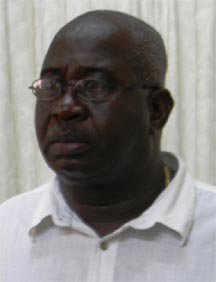An imbroglio relating to the financing of the Local Government Commission (LGC) has been resolved with the Ministry of Finance approving the LGC’s 2019 work programme and releasing funds for the payment of January expenses including the salaries and emoluments for staff and commissioners.
“The matter has been resolved and the LGC has made payments to its staff,” Chairman Mortimer Mingo told Stabroek News in a brief comment yesterday. This newspaper understands that the approval came after a meeting between Mingo and Finance Secretary Michael Joseph.
Last week, Mingo had said that the commission had been effectively shut down since it could not access funds to pay its staff and bills. At the time, he blamed the shutdown on the refusal of Permanent Secretary (PS) of the Ministry of Communities Emile McGarrell to counter-sign the documents that would release finances to the agency.
McGarrell had, however, said that the commission had not submitted a work programme and cash flow that reflects the $124 million allocated to the agency for 2019. If this cannot be done, then no assistance can be offered to the agency, he said explaining that the commission had, following a meeting in late January, submitted a programme which had been sent to the Ministry of Finance for approval.
“They have submitted a work plan and we have forwarded it to the Ministry of Finance; I can’t act outside my authority, I have no authority over them and I don’t have authority to act outside of Ministry of Finance guidelines,” the PS stressed.
The issue apparently stemmed from the fact that the sum allocated for the agency was significantly less than that which was requested.
At a press conference, Mingo had explained that the commission had initially submitted to the Ministry of Finance, a proposal for $305 million for both its capital and its operations budget. This budget was approved first by the commission and according to Mingo, was in keeping with the work programme which would have been executed in 2019. Also included in the proposal were wages, salaries and emoluments for the commissioners and the staff. However, less than half of that sum, $124 million, was actually allocated and in January, the Ministry of Communities noted that the 2019 employment cost for the LGC’s commissioners and staff accounted for 91.4 per cent of the allocation. The Ministry therefore requested that the LGC restructure its work programme. It is this restructured work programme which has now been approved.
In this programme, emoluments now account for 54 per cent of the allocation due to a reduction in the proposed remuneration for commissioners.
Notably, though the LGC is a constitutional agency, it has not yet been added to the third schedule of the Constitution which provides for such agencies to have financial autonomy. The commission is therefore being treated financially as a budget agency subject to the directives of the Ministry of Finance.
An amendment similar to the 2015 Constitution (Amendment) Bill is necessary for this state of affairs to change.
In 2015, Attorney General Basil Williams presented the Constitution (Amendment) Bill 2015 as a means to restore due constitutionality and the independence of certain constitutional agencies and bodies. The Bill was previously passed by the APNU and AFC while they were in opposition, but they failed to persuade then President Donald Ramotar to assent to the legislation. It was eventually presented to the House in the absence of the opposition who objected to its passage.
The 2015 Bill amended the Third Schedule of Article 222 (A) of the Constitution to assure the independence of entities, including the Chambers of the Director of Public Prosecutions, the Judicial Service Commission, the Public Service Commission, the Police Service Commission, the Teaching Service Commission, the Public Service Appellate Tribunal, the Public Procurement Commission, Office of the Ombudsman and the Guyana Elections Commission.
It further provided for the expenditure of each of the entities to be financed as a direct charge on the Consolidated Fund, determined as a lump sum by way of an annual subvention approved by the National Assembly.
Before its passage, the Third Schedule only listed the Ethnic Relations Commission, the Human Rights Commission, the Women and Gender Equality Commission, the Indigenous Peoples’ Commission, the Rights of the Child Commission, the judiciary and the Office of the Auditor General.





